If you’re considering putting up a fence, understanding how Virginia’s challenging climate affects different fencing materials is crucial for protecting your investment. This central community experiences hot, humid summers with intense UV exposure and cold winters that can cause significant material stress. Weather-resistant fencing in Bensley, VA can withstand the region’s dramatic seasonal temperature changes.
Understanding Bensley, VA’s Climate Impact on Fence Materials
The Richmond metropolitan area, including Bensley, experiences a humid subtropical climate with temperature extremes that severely test fence durability. Central Virginia’s climate includes hot summers with high humidity levels and cold winters, creating significant annual temperature variations that stress all fencing materials.
UV radiation intensity in central Virginia peaks during summer months, causing accelerated degradation of fence materials lacking proper protection. This region receives significant solar exposure that breaks down polymer chains in vinyl and causes wood graying and weakening over time.
Precipitation patterns include substantial seasonal rainfall, with severe thunderstorms bringing damaging winds that stress improperly installed fences. Winter freeze-thaw cycles create ground movement that affects post stability, particularly in areas with poor drainage around developments near Wamsley Blvd.
Material-Specific Weather Vulnerabilities in Bensley
Vinyl Fencing Challenges
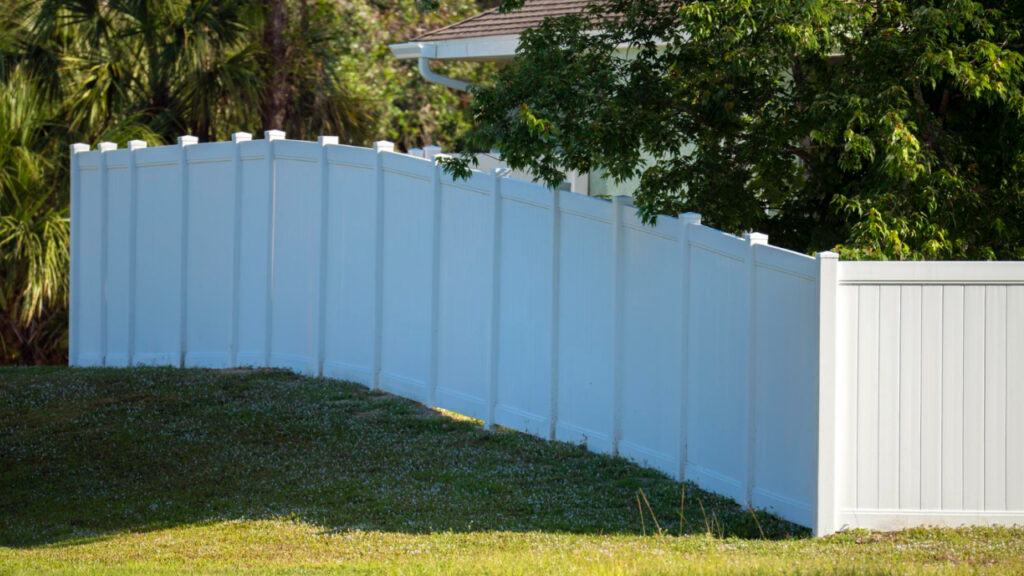
Vinyl fences face cold-weather brittleness during Virginia winters, becoming susceptible to cracking when temperatures drop significantly. UV exposure causes yellowing and chalking, particularly on south-facing installations. Thermal expansion during hot summer days can cause panels to bow or warp if not properly installed with adequate spacing.
Wood Fence Vulnerabilities
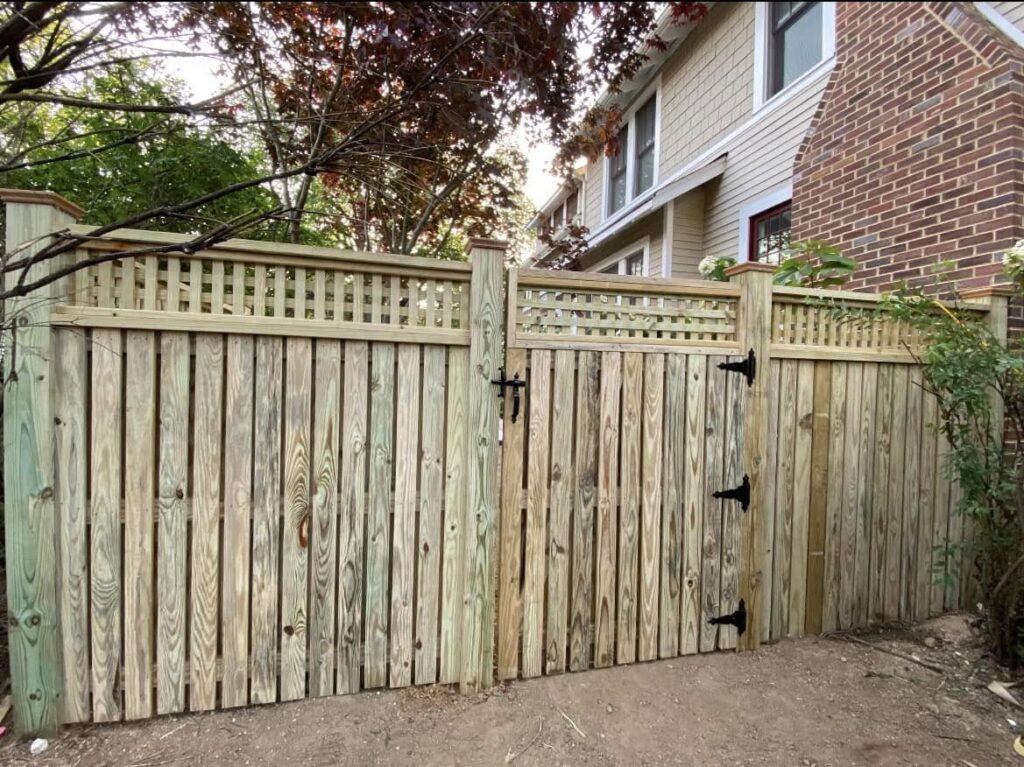
Wood fence materials absorb moisture during humid summers and wet seasons, leading to warping, splitting, and rot. Cedar and pressure-treated lumber perform better than standard pine, but all wood requires regular maintenance to prevent UV graying and insect damage common in the Richmond area.
Metal Fencing Issues
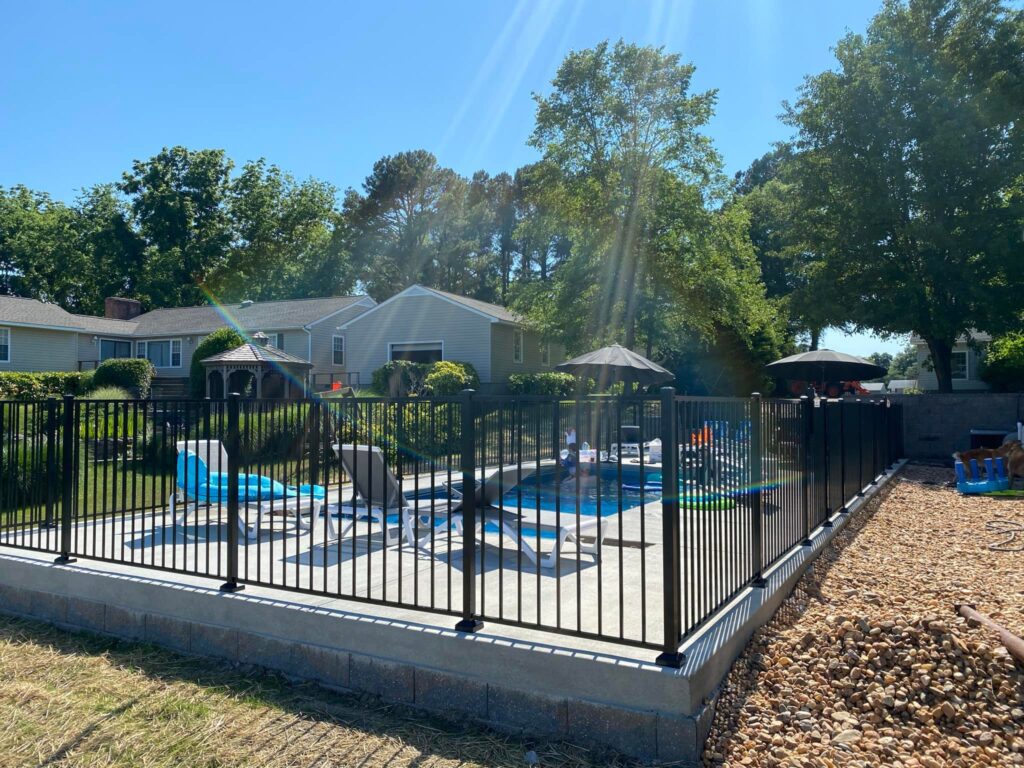
Steel and iron fences develop rust and corrosion when protective coatings fail. Wrought iron installations require specialized maintenance to prevent oxidation, while aluminum fences resist corrosion better but can suffer thermal expansion problems during extreme temperature changes.
Professional Weather-Proofing Solutions
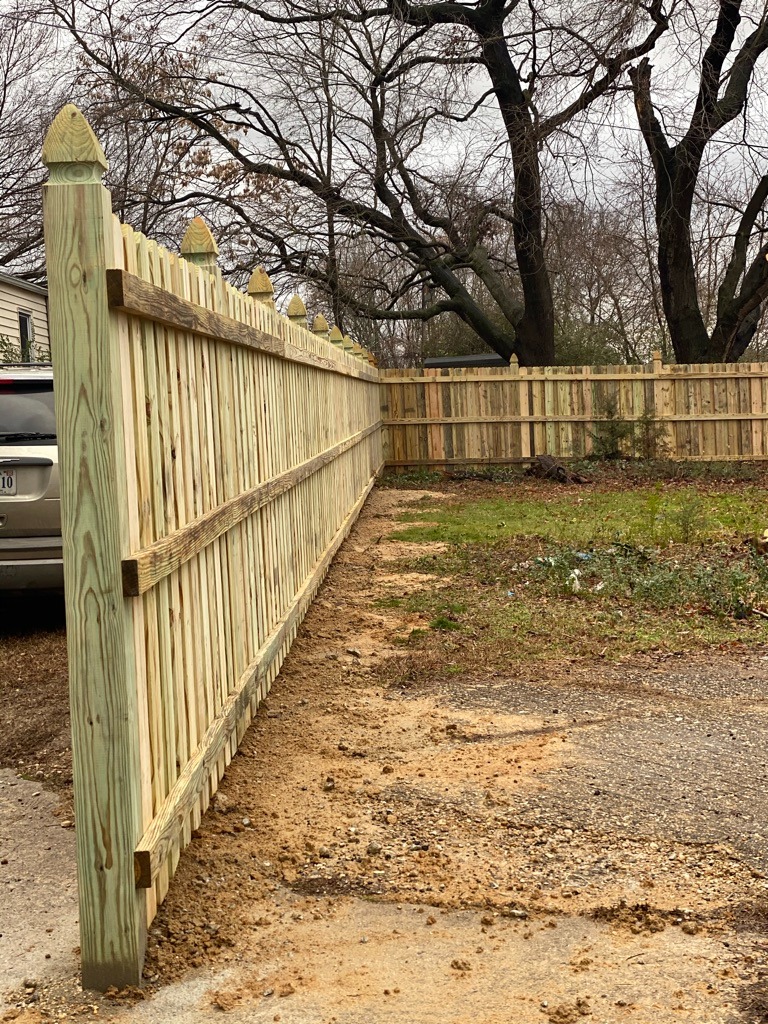
Installation Techniques for the Virginia Climate
Proper fence installation requires posts set below the frost line as determined by local building codes to prevent heaving during freeze-thaw cycles. Professional fence installation includes concrete footings that resist ground movement and provide stable anchoring during storms.
Protective Treatments and Coatings
UV-resistant sealers extend wood fence life significantly when applied regularly. Metal fences benefit from primer and topcoat systems designed for Bensley’s humidity levels. Chain link installations require galvanized or vinyl-coated materials to prevent rust formation.
Hardware Selection
Weather-resistant fasteners using stainless steel or galvanized materials prevent premature failure. Gate hardware must withstand thermal expansion while maintaining smooth operation throughout seasonal temperature changes.
Climate-Specific Material Selection for Bensley
Best Materials for Virginia Weather
Aluminum fences offer excellent durability in Virginia’s climate, resisting corrosion while handling thermal expansion better than steel fences. Composite materials combine wood aesthetics with enhanced weather resistance, though initial costs exceed traditional wood fence options.
UV-Resistant Options
Picket fence installations in Bensley using UV-stabilized vinyl or properly sealed cedar provide an attractive appearance while withstanding intense summer sun exposure. A chain link with vinyl coating offers budget-friendly weather protection for larger properties.
Storm Resistance Standards
Fence construction must account for wind loads common during severe weather events. Professional installations include wind-rated materials and proper spacing to minimize storm damage risk.
Seasonal Maintenance and Protection Protocols
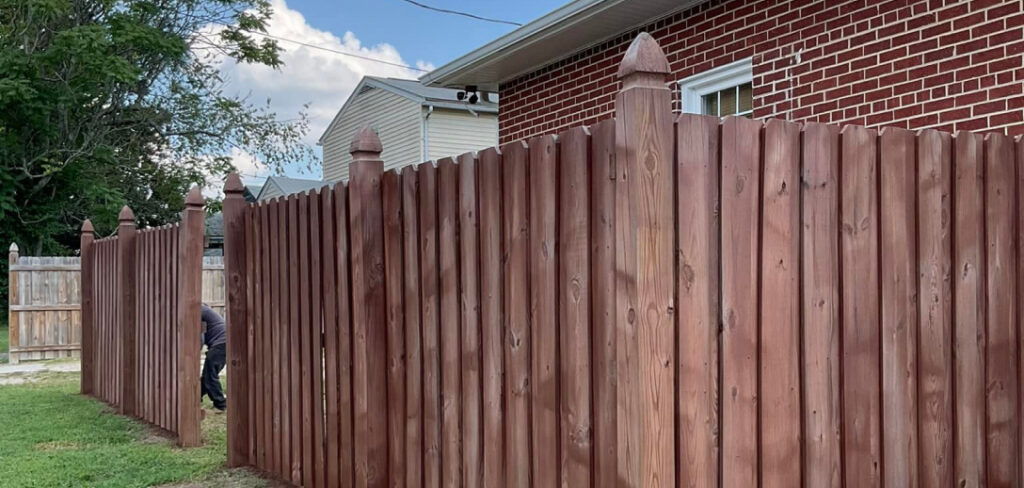
Spring Preparation
Post-winter damage assessment should include checking for frost-damaged posts, loose hardware, and fence panels affected by ice loading. Minor repair tasks prevent major problems requiring complete fence replacement.
Summer Protection
Regular cleaning removes dirt and organic matter that can trap moisture against fence materials. Trimming vegetation around fence lines improves air circulation and reduces humidity-related damage.
Fall Winterization
Apply protective sealers to wood surfaces before winter weather arrives. Clear drainage areas around posts to prevent ice formation that could damage concrete footings.
Winter Monitoring
Remove snow loads that exceed manufacturer specifications, particularly on vinyl and wood fences. Ice accumulation can cause panels to bow or crack if weight limits are exceeded.
Local Considerations
Property owners should consult with the Chesterfield County Building and Inspections Department for current permit requirements and fence height restrictions. The county’s building officials provide specific guidelines for fence installation in areas prone to poor drainage, common near developments around Caldwell Ave.
Properties near commercial areas like Ambitious Apparel Clothing Store may face additional wind exposure, requiring enhanced anchoring systems. Landscape considerations include protecting fences from mature trees that could fall during storms.
DIY vs. Professional Weather-Proofing
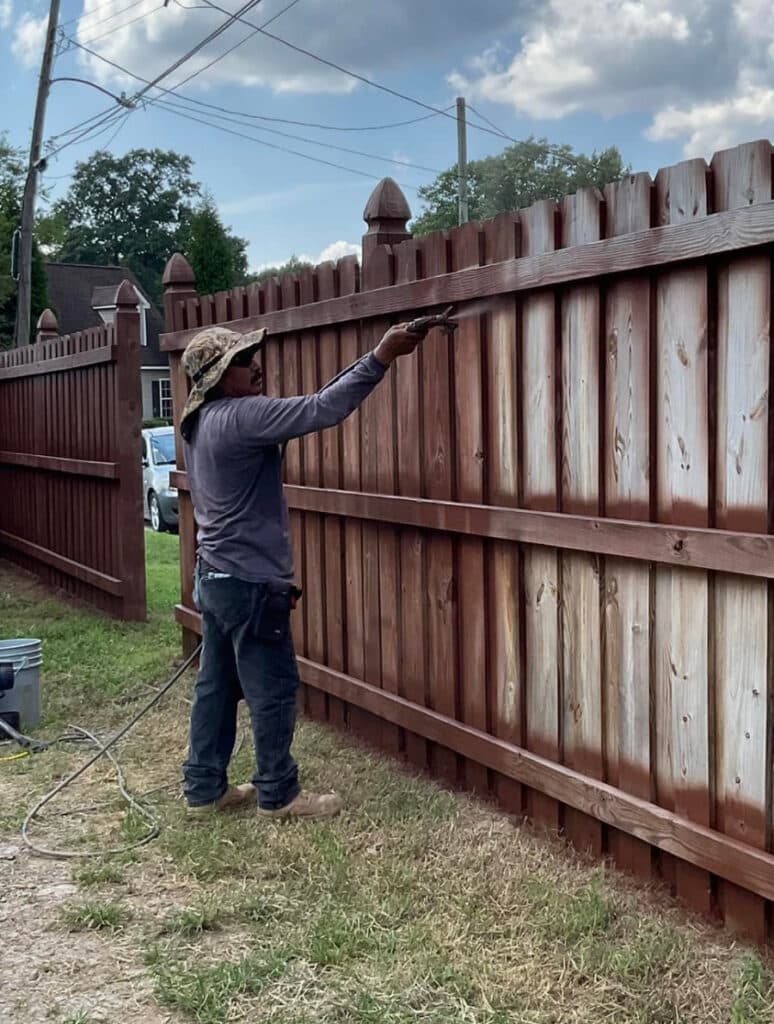
Homeowner Capabilities
Property owners can handle routine maintenance like cleaning, minor repair tasks, and applying protective sealers to wood fences. Basic installation of temporary fencing or fence sections on level ground may be suitable for DIY projects.
Professional Requirements
Complex installations requiring concrete footings, grade adjustments, or specialized materials need experienced contractor expertise. Fence company professionals understand local soil conditions and the proper techniques for Virginia’s climate challenges.
Cost-Benefit Analysis
Professional installation typically includes warranties covering weather-related failures, providing long-term value compared to DIY installations that may fail prematurely in Bensley. Quality fence installation company service reduces replacement costs over the fence’s lifespan.
Technology and Innovation for Weather Resistance
Advanced steel alloys and powder coating systems provide enhanced corrosion resistance for metal fences. Smart monitoring systems can detect early signs of weather damage, alerting property owners to potential problems before major repairs become necessary.
Temporary chain link solutions offer flexible protection during extreme weather events, allowing removal of vulnerable sections during severe storm warnings.
Frequently Asked Questions
How long do different fence materials last in Bensley's climate?
Wood fences typically last 10-15 years with proper maintenance, while aluminum and vinyl can exceed 20 years. Professional installation and regular care significantly extend all material lifespans.
What's the best fence material for Virginia weather?
Aluminum fences offer an excellent combination of durability, weather resistance, and low maintenance for central Virginia conditions. Steel options work well with proper protective coatings
When should I schedule fence installation in Bensley?
Spring and fall provide optimal conditions for fence construction when ground conditions are stable and the weather is moderate. Avoid winter installations when ground conditions may be challenging.
Do I need permits for fence installation in Chesterfield County?
Permit requirements vary by fence height and location, so check with the Chesterfield County Building and Inspections Department for specific requirements. Corner lots may have additional restrictions
How much should I budget for weather-resistant fencing?
Quality weather-resistant fencing costs more than basic materials but provides significantly longer service life. Free estimates help determine project costs based on specific property needs
Your New Fence Is Just A Call Away
Protect your property investment with professional weather-resistant fencing designed for Virginia’s challenging climate. Dubon Fencing & Polish Concrete LLC specializes in installation services that withstand central Virginia’s temperature extremes, storm conditions, and UV exposure. Our experienced team understands local soil conditions and building requirements to ensure your fence provides lasting protection and aesthetics.
Request your free quote today to discuss weather-proof fencing solutions that protect your Bensley property for years to come.
